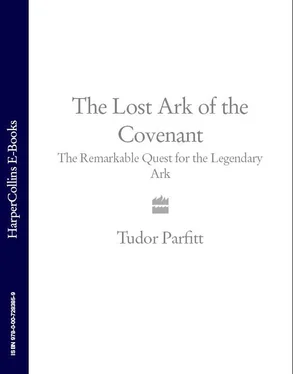1 ...6 7 8 10 11 12 ...19 It was through endless conversations with Lola and the kids’ parents that I began to understand something of the tragedy of recent Jewish history. Lola’s own story was dreadful enough. A Polish Jewess from Radom, Lola had lost most of her family members during the Holocaust: they were gassed at Auschwitz. In 1939, before the war, she was a beautiful and talented young woman, studying to be a doctor. For a Jew to be admitted to a medical faculty in Poland in the years before the Second World War was virtually impossible. The entrance exams she wrote were literally faultless. They had to admit her. She was a young genius. After the German invasion Lola’s world fell apart. Her young husband, kicked out of Germany as a Jew was shot by the Russians as a German. She managed to escape from Poland via Russia and arrived in Jerusalem in 1943.
The day I visited her she was all alone in her small apartment. Like many Jerusalemites she was afraid that Saddam would launch poisoned gas missiles against the city. Now an old woman she was standing on a chair trying to tape plastic sheets to the window in the vain hope of making them impervious to gas attack. Of all the people I knew she was the last one upon whom I would have wished this futile activity.
As I helped her down from the chair she said between clenched teeth, ‘They gassed my mother and my father, they gassed my aunts and uncles, and cousins. They gassed my friends from school. They gassed my childhood sweetheart from next door. But you know, they are not, they are not going to gas me.’
She slumped into a chair and burst into tears. I finished taping up the plastic sheeting. There were places where it would not stick onto the window frame and you could feel the draft coming straight through. This protection would not keep out a medium-strength breeze let alone a poison gas attack.
By the time I went to Oxford I knew a great deal more about Jewish suffering than most gentiles and like all sane people I wanted to see an end to it. Like Reuven I also passionately wished to see Jews and Arabs reconciled. Maybe, I thought, a crazy idea like Reuven’s was worth considering. Even a lavishly funded worldwide search for the Ark would cost less than even a couple of American smart missiles.
Reuven left at about two o clock. I stayed up for another couple of hours staring into the embers of the olive wood fire, dreaming about my friend’s quest. When, finally, I went to bed I couldn’t sleep. The whole house stank of paraffin. To get some fresh air I pulled on my old brown Arab jalabiyyeh and went on to the roof terrace of my house.
Jerusalem was bathed in cold white moonlight. Looking towards the Temple Mount, I could see the great golden cupola of the Dome of the Rock shimmering in the pale light. On this night, the city was breathlessly beautiful. In the Talmud it is written, ‘God gave ten measures of beauty to the world: nine measures he gave to Jerusalem and one only for all the rest of creation.’ It was here that the Temple had once stood. The rocky outcrop over which the golden cupola of the Dome of the Rock had been constructed once formed part of the Holy of Holies where, according to Jewish mythology, King Solomon had placed the Ark.
It seemed to me that the stories that surrounded the Ark were the stuff of fairy tales. In much of Jewish tradition there was something ineffably improbable about the Ark. The texts maintained that when the Ark was brought into the Temple by Solomon, the very wood and gold with which it was made came alive and formed trees which yielded abundant harvests of fruit. The Ark breathed life into everything. It was only when the faithless Israelite king Manasseh, hated by Jewish tradition, brought a foreign idol into the Temple that the miraculous trees dried up and the fruit withered on the branch.
This was strange, I thought, as I gazed out at the night. The Ark at some level was the secret weapon of the ancient Israelites. It meted out death, yet it breathed life into everything. These properties seemed to carry a powerful mystical message. Reuven had explained that for the Kabbalists this dualism expressed different and opposite forces acting in the Universe. When the two properties of the Ark were finally in harmony the Messianic era would arrive. Whatever the Ark expressed symbolically, it was pretty extraordinary. But had it ever been a real, objective thing or was it just a powerfully symbolic multi-layered, multi-tasking myth?
I stayed on the roof for a long time, huddled in my rough woollen cloak, gazing at the sleeping city.
But what, I asked myself, if the Ark were more than just an imagined, mythical construct - the legend of a visible little home for an invisible big God?
Some had said that the Ark was still buried in a secret passage beneath the Dome. Others had claimed it might have been secreted away to the Judean Hills, which I could see all around me on the distant horizon; or further still to the Arabian Desert; alternatively, in the murky depths of the Kinneret.
I had even heard rumours from starving refugees when I had been in Ethiopia a few years before at the time of the great famine, that the Ark had been taken to Africa by the first Ethiopian emperor Menelik. And I had heard about a strange Ark-like object when I was in southern Africa. As I thought of where the Ark might be, I could feel a growing, irrational excitement course through my veins.
The words of Kipling that I had loved as a boy came into my mind. ‘Something hidden. Go and find it. Go and look behind the ranges - something lost behind the ranges. Lost and waiting for you. Go!’
But had the Ark ever really existed? Was there anything hidden? Anything to look for? I had my doubts.
My mind turned to Reuven. Sometimes when I looked at him I could sense an awareness of things which few people had. His eyes, which had been trained to discern the slightest flaw in gems, seemed to see further and with greater clarity than normal eyes. However, I wondered if he was as capable of seeing flaws in arguments as he was of seeing flaws in gems.
I could see that if his quest ever delivered this enigmatic object, as an actual object, in some physical manifestation, its discovery would achieve more than a thousand unread monographs.
But was there any earthly way in which I could help him? Could I help him to change the world? Did I want to?

Protocols Of The Priests
The sirens howled all night. Groggily I faced a new Jerusalem day and realized that I had a growing obsession. Reuven’s infatuation with the Ark had now taken over my dream time as well as a lot of my waking hours. It seemed absurd but I couldn’t get it out of my mind.
When he had come round to my place a week before, Reuven had asked me to provide him with a scholarly reading list and this day would be spent achieving that goal.
It was the day when the scales fell from eyes and I saw the Ark for what it was.
I had made an appointment to see a distinguished academic in the field of Ancient Semitic Studies: Chaim Rabin, Professor of Hebrew at the Hebrew University in Jerusalem. Many years before, Rabin had taught at Oxford, where I had studied. His successor, David Patterson, who had been my teacher, had often urged me to look him up. To ask Rabin’s help in compiling a bibliography was a perfect excuse finally to make his acquaintance. He was a quite outstanding scholar even though by now he was getting on in age and I had heard that his mind was beginning to wander from time to time.
I walked from the Old City across town to the modern quarter of Rehavia and found the old scholar waiting for me in his neighbourhood café. Rabin was a balding little man with bushy eyebrows, keen probing eyes, and an infectious smile. As we sat drinking a lemon tea in its silver-rimmed glass, I explained the background to my visit, without saying anything about Reuven. I wanted hard facts about the Ark from a wise, unbiased source.
Читать дальше













